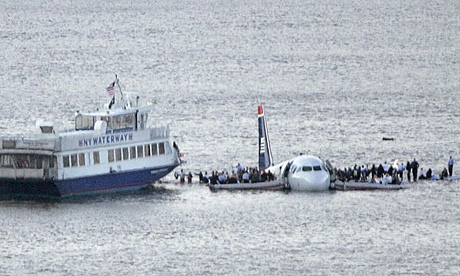I prayed a prayer of thanksgiving yesterday when I heard the news that there were no fatalities or injuries after an airliner crashed into the Hudson River. All good things come from God–so says the Bible, and so says my Mom, who is prone to utter “Thank you, Lawd!” (in her Southern Belle drawl) for all sorts of things, from a shining sun to a sale on apples.
So I followed in her steps yesterday, and am still in awe as I read the stories today. It really is a stupendous, mind-boggling, joy-inducing story. Every person who was on that plane is having the best day of their lives day today–now that they’ve tasted death, their lives may never be the same.

But I’m brought up short by all this talk of “Miracle on the Hudson.” That sort of language was being used from early on yesterday, when it really did look like something impossible-for-man-but-possible-for-God had occurred. A miracle, strictly speaking, is an event that breaks the laws of nature–something that literally bends the rules of the universe. A barren woman becoming pregnant without help from scientific manipulation is a miracle. A brain tumor vanishing just before surgery is a miracle.
At first, this crash looked like that. But soon, it became clear that the man flying US Airways flight 1549, Capt. C.B. Sullenberger, had displayed enormous poise and professionalism. Ditching a plane is no easy task, and not something for which one can prepare short of simulated practice. Capt. Sullenberger called on all his faculties to ignore the air controller’s advice to divert the plane to Jersey and ditch it in water instead–a procedure that, in an airliner, isn’t as simple as gliding toward the ground.
That’s human ability at its finest. It blows my mind that humans can do things like that, and it calls for shouts of joy and thanksgiving.
But it’s not a miracle.
Update: I was rushing out before, but I should say two words about why this matters:
1. It matters because it highlights a strange aspect of our media. As the likes of Get Religion and The Revealer are forever pointing out, many fine reporters are tone deaf when it comes to matters of faith. They often don’t know what to make of people who believe in, and live by, things supernatural. Some media outlets are downright allergic to religion. (Again, check Get Religion and The Revealer for a running report.) So it’s odd, isn’t it, to see the media suddenly, liberally, and uncritically using supernatural language? I understand, of course, that a hed writer, if asked, would say s/he doesn’t mean it literally, was quoting a witness, etc. Still…it highlights a fascinating incongruity.
2. It matters because miracles are an important and controversial aspect of Christian doctrine. They are a special and rare category, limited to the such things as I mentioned above and, oh, the resurrection. Christians get this wrong more than anyone, I suppose–it’s not uncommon to hear a believer calling things “miracles” that aren’t, from sports championships to the sun shining on an outdoor wedding in May.
And now I’ll give it a rest.

